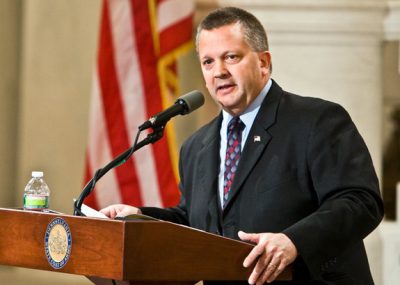State and Local

Businesses Warn State Lawmakers That Immigration Legislation Will Break the Bank
As many state legislative sessions come to a close, lawmakers are giving serious thought about proceeding with restrictive immigration legislation. Legislators in some states (Colorado, Iowa, Kentucky, Nebraska, New Hampshire, South Dakota, Virginia, Wyoming, and most recently, Arizona) have canned restrictive enforcement legislation due to prohibitive costs and push back from business and community groups while lawmakers in other states (Kansas, Indiana, and Oklahoma) continued the debate this week. Although legislation continues to move in states like Georgia and South Carolina, one thing is certain—the fiscal consequences of these laws are real and business groups are putting their legislators on notice. Read More

Utah Governor Signs Series of Controversial Immigration Bills
Utah Governor Gary Herbert signed a package of controversial immigration bills today in the Utah's state capitol. The measures include a series of immigration bills passed by Utah’s legislature last week, including HB 497 (a revised SB1070-inspired immigration-enforcement bill), HB 116 (which creates a guest worker program through federal waivers) and HB 466 (which sets up a temporary worker pilot program with Mexico). While many have applauded Utah’s efforts to look beyond the narrow scope of enforcement-only measures to a more sensible immigration debate, the same people question the constitutionality of these measures—including the state’s own Attorney General. Read More

New Report Profiles Rising Stars in Anti-Immigrant Movement
State Legislators for Legal Immigration (SLLI) ringleader, state Rep. Daryl Metcalfe (R-PA). Photo by SLLI. Last week, the Southern Poverty Law Center (SPLC) released a new report, “Attacking the Constitution: State Legislators for Legal Immigration (SLLI) and the Anti-Immigrant Movement,” which examines a dozen leading members of SLLI. The report also links SLLI (and state legislators from across the U.S. who comprise its membership) with the notoriously anti-immigrant John Tanton Network—including his front group FAIR (designated as a “hate” group by SPLC). While the report focuses mainly on SLLI members and their quest to rewrite the U.S. Constitution to deny citizenship to the children of the undocumented, their anti-immigrant efforts extend to a wide range of destructive state legislation. Read More

States Legislators Attempt to Reframe Enforcement-Only Approach to Immigration
Heading into legislative sessions this year, many state lawmakers seemed to be on a collision course with enforcement-only immigration proposals. This week, however, legislators in Utah at least attempted to look beyond the narrow scope of enforcement to proposals that aimed at a more balanced immigration debate. States like Nebraska and Kentucky also attempted to reframe the debate this week by stalling or rejecting enforcement-only measures while groups in other states—Kansas, Alabama, South Carolina, Georgia and Florida—continued to blow the whistle on restrictive measures that neither solve our immigration problems nor help the state economy. Read More

Police Forum Recommends Limitations on Investigating Immigration Status
The role of local police in immigration enforcement continues to be a complex policy and legislative issue at both the state and federal level. State legislatures, for example, are contemplating bills designed to increase the role of local police in immigration enforcement while federal legislation targets cities with so-called “sanctuary policies.” And as programs like 287(g), Secure Communities and other federal/local partnerships continue to expand, local police are now more involved in identifying undocumented immigrants than ever before. Many law enforcement officers, however, find that enforcing federal immigration law may interfere with their ability to prevent crime and keep neighborhoods safe, so they have designed tailored local policies to ensure that they maintain the best possible relationship with their communities. In a new report by the Police Executive Research Forum (PERF), local police speak out on the difficulties of enforcing immigration laws and talk about best practices for navigating immigration issues in the future. Read More

Is Utah’s “Immigration Solution” All It’s Cracked Up To Be?
Late Friday night, the Utah Legislature passed three immigration-related bills that now go to the Governor for his signature or veto in the coming week. While some may be quick to celebrate Utah’s unique approach to immigration, others are left wondering whether these bills are all they’re cracked up to be. The first measure (HB 497) is an SB1070-inspired immigration enforcement bill that would go into effect in early May if signed by the Governor. It presents many of the same concerns people had about Arizona’s SB1070—that it would allow local police to enforce federal immigration laws to the detriment of public safety, rack up high implementation costs, threaten racial profiling, and damage the state’s reputation. Read More

States Playing with Enforcement-Only Fire Likely to Get Burned
The steady drumbeat of protest continued this week in states considering restrictive immigration measures. Indiana, for example, got a taste of forthcoming economic backlash when two organizations threatened to pull conventions from the state if enforcement legislation passed—a costly lesson Arizona knows well. Legislators in other states considering similar measures—Nebraska, Michigan, Arizona and Alabama—also heard from concerned members of the community this week who fear the economic and social damage these measures will cause in their state. Although playing with enforcement-only immigration measures might have helped some of these state lawmakers light up their political careers, taxpayers are starting to realize that they're ultimately going to get burned. Read More

Georgia State Legislature Pursuing Budget Busting Solutions to Immigration
Washington D.C. – In the face of a $1.7 billion budget shortfall in fiscal year 2011, Georgia state legislators are currently pursuing anti-immigrant legislation that could further damage the state’s bottom line. House Bill 87, a copycat of Arizona’s SB1070, is currently working its way through the state legislature… Read More

Will State Legislators Continue to Pull the Plug on Restrictive Immigration Measures?
While some state lawmakers continue to tango with restrictive immigration bills this week, others pulled the plug on measures they worried were too costly or politically risky. Lawmakers in Arkansas, New Mexico and Nebraska voted down (or anticipated the failure of) measures that would restrict access to preventative medical care, tuition equity and driver’s licenses for undocumented immigrants. Others, however, in Michigan, Georgia, Indiana and Arizona continued attempts to move costly enforcement laws. But a trend emerged from the states this week, a trend that has been brewing over the last few months—lawmakers are tired of the restrictionist status quo. They—like the folks in Texas, Michigan and Utah this week—want real solutions to our immigration problems that won’t financially or morally bankrupt their state. Read More

State Compacts Reframe Approach to Immigration, But Will Legislators Listen?
Rather than allow immigration restrictionists to define how their state deals with immigration, business leaders, elected officials, community activists and faith groups in Utah and Indiana have taken an important step in reframing their state's approach by signing “state compacts”—declarations of principles to guide the state’s immigration discussion. And they’re not the only folks standing up to costly state enforcement legislation. Some progressive legislators are proposing their own immigration measures which add much needed revenue to the state’s economy. Sadly, legislators like Utah state Rep. Stephen Sandstrom are ignoring these efforts and are instead moving forward with harsh, anti-immigrant legislation in an attempt to look tough and grab headlines. Read More
Make a contribution
Make a direct impact on the lives of immigrants.
